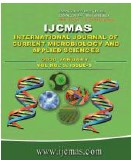


 National Academy of Agricultural Sciences (NAAS)
National Academy of Agricultural Sciences (NAAS)

|
PRINT ISSN : 2319-7692
Online ISSN : 2319-7706 Issues : 12 per year Publisher : Excellent Publishers Email : editorijcmas@gmail.com / submit@ijcmas.com Editor-in-chief: Dr.M.Prakash Index Copernicus ICV 2018: 95.39 NAAS RATING 2020: 5.38 |
The investigation entitled “Effect of terminal heat stress on variability in physiological traits of Indian mustard (Brassica juncea L.) due to late sown situation” was conductedrabi season during 2017-18 and 2018-19 at Oil seed research Farm Kalyanpur of C. S. Azad University of Agriculture and Technology, Kanpur (U.P.) in randomized block design with three replications and twelve Indian mustard genotype. Physiological parameters i.e., Chlorophyll Content was recorded at anthesis and siliquae initiation stage; Chlorophyll Stability Index (CSI %), Net Photosynthesis Rate [(Pn) (µ mol/m-2/s-1)],Relative Water Content (RWC %)and Canopy Temperature Depression (CTD 0C) were estimated at pre-flowering and post-flowering stage.Study revealed that DRMRIJ16-3, RGN-403 and RH-1556 recorded higher CSI (0.53, 0.52 and 0.46), net photosynthesis rate (33.5, 33.0 and 32.6), Relative Water Content (60.8, 59.7 and 59.1) and canopy temperature depression (3.5, 3.7 and 3.5) at post-flowering stage, while higher chlorophyll content was recorded (41.3, 40.6 and 39.2) at siliquae initiation stage. The study indicated that mustard genotypesDRMRIJ16-3, RGN-403 and RH-1556 had tolerance to high temperature stress with delayed sowing, as they maintained higher values of these physiological parameters.
 |
 |
 |
 |
 |